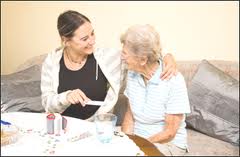Dutch Model Offers New Approach to Home Care (Australian Ageing Agenda)
Not-for-profit organisation Buurtzorg Nederland, founded and developed by community nurses, is transforming home care in the Netherlands and is quickly garnering attention worldwide.
Since its development in 2006, the Buurtzorg or “neighbourhood care” model has attracted the interest of more than 25 countries including the National Health Service in England. Sweden, Japan and the US state of Minnesota have already begun introducing Buurtzorg nurse-led teams in their jurisdictions.
Speaking to Australian Ageing Agenda ahead of his keynote address to the Leading Age Services Australia (LASA) National Congress in October, founder and director Jos de Blok said his home care model has been shown to deliver higher quality care at a reduced cost. A 2010 Ernst and Young report said costs per patient were approximately 40 per cent less than comparable home care organisations and surveys have shown that patient satisfaction is the highest in the country.
At the heart of the nurse-led model is client empowerment by making the most of the clients’ existing capabilities, resources and environment and emphasising self management.
“The model is much more focused on self-support and working with high qualified nurses that have skills in coaching and supporting patients to do the things that they are able to do themselves,” Mr de Blok told AAA.
While the costs per hour are higher from employing registered nurses, savings are made through lower overhead costs and a reduction in the overall number of care hours required per client.
Notably, the Dutch approach represents a challenge to the wisdom of low-skill, low cost staffing models which have tended to dominate health and aged care systems by demonstrating how a high-skill professional model can deliver greater efficiency.
The model also demonstrates the benefits of handing control over to the nurses that run the service.
Under the model, Buurtzorg nurses form self-organising or autonomous teams that provide a complete range of home care services supported by technology and with minimal administrative oversight. “The nurses organise all the work themselves, so there is no management structure and no hierarchy,” said Mr de Blok. The small teams of up to 12 nurses work in close collaboration with patients, doctors, allied health professionals and informal community networks to support the patient.
The emphasis on continuity of care and patient-centred care strengthens the quality of client-staff relationships and has been shown to improve both patient satisfaction and nursing staff morale.
Click here to read the full Australian Ageing Agenda article.

